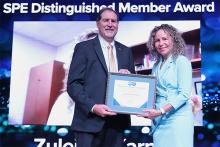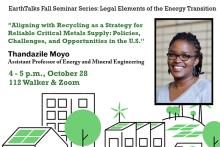Zuleima Karpyn, Donohue Family Professor of Petroleum and Natural Gas Engineering, and associate dean for graduate education and research in the College of Earth and Mineral Sciences, was recently named a distinguished member by the Society of Petroleum Engineers.
Joshua Hasenau, a third-year Penn State student has asummer internship with the New Enterprise Stone and Lime Company, a construction company that produces aggregates, asphalt and concrete.
Nelson Y. Dzade, assistant professor of energy and mineral engineering in the Penn State College of Earth and Mineral Sciences, has received a 2024 Early Career Research Award from the U.S. Department of Energy (DOE).
Thandazile Moyo, assistant professor of energy and mineral engineering at Penn State, will give the talk, “Aligning with Recycling as a Strategy for Reliable Critical Metals Supply: Policies, Challenges, and Opportunities in the U.S.,” at 4 p.m. on Monday, Oct. 28, in 112 Walker Building on the University Park campus.
This fall, the Millennium Café at Penn State will feature researchers who were awarded Climate Solutions Accelerator workshops by the Penn State Climate Consortium. The talks will occur at 10 a.m. on Oct. 1, Oct. 22 and Dec. 3 on the third floor of the Millennium Science Complex.
Olivia DiPrinzio, energy engineering and earth science and policy major, is one of five nominated for the competitive and prestigious Rhodes and Marshall scholarships.
The Center for Quantitative Imaging (CQI) recently supported a three-day additive manufacturing practicum for industry professionals to gain hands-on experience in using 3D X-ray CT scanning.
Twelve Penn State alumni will be honored for their outstanding professional accomplishments and named Alumni Fellows for 2024, the most prestigious designation given by the Penn State Alumni Association.
Seth Blumsack, professor, energy policy and economics, has been selected as one of Penn State Emerging Academic Leaders for fall 2024.
Penn State and Shell USA Inc. have announced the launch of a collaboration. An initial commitment from Shell of more than $1 million will fund initiatives focused on energy transition, decarbonization, polymer recycling and biodiversity, and the creation of an inclusive and innovative energy workforce.











